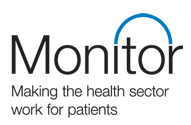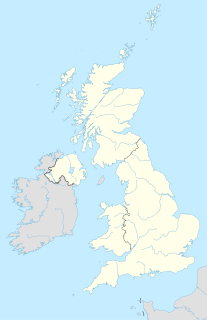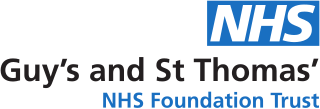Related Research Articles
An NHS foundation trust is a semi-autonomous organisational unit within the National Health Service in England. They have a degree of independence from the Department of Health and Social Care. As of March 2019 there were 151 NHS Foundation Trusts.

Monitor was an executive non-departmental public body of the Department of Health, responsible for ensuring healthcare provision in NHS England was financially effective. It was the sector regulator for health services in England. Its chief executive was Ian Dalton and its Chair is Dido Harding. Monitor was merged with the NHS Trust Development Authority to form NHS Improvement on 1 April 2016.
Independent sector treatment centres (ISTCs) are private-sector owned treatment centres contracted within the English National Health Service to treat NHS patients free at the point of use. They are sometimes referred to as 'surgicentres' or ‘specialist hospitals’. ISTCs are often co-located with NHS hospitals. They perform common elective surgery and diagnostic procedures and tests. Typically they undertake 'bulk' surgery such as hip replacements, cataract operations or MRI scans rather than more complex operations such as neurosurgery.

Emergency medical services in the United Kingdom provide emergency care to people with acute illness or injury and are predominantly provided free at the point of use by the four National Health Services of England, Scotland, Wales, and Northern Ireland. Emergency care including ambulance and emergency department treatment is only free to UK Nationals and a charge may be made to those not entitled to free NHS Care.
King's College Hospital NHS Foundation Trust is an NHS trust in London, England. It is closely involved with Guy's and St Thomas' NHS Foundation Trust, with which it shares its chair, Sir Hugh Taylor, its strategy director and IT director. It is assumed that the two organisations will eventually merge.

Health care in the United Kingdom is a devolved matter, with England, Northern Ireland, Scotland and Wales each having their own systems of publicly funded healthcare, funded by and accountable to separate governments and parliaments, together with smaller private sector and voluntary provision. As a result of each country having different policies and priorities, a variety of differences now exist between these systems.

The National Health Service (NHS) is the publicly funded healthcare system in England, and one of the four National Health Service systems in the United Kingdom. It is the second largest single-payer healthcare system in the world after the Brazilian Sistema Único de Saúde. Primarily funded by the government from general taxation, and overseen by the Department of Health and Social Care, the NHS provides healthcare to all legal English residents and residents from other regions of the UK, with most services free at the point of use. Some services, such as emergency treatment and treatment of infectious diseases, are free for everyone, including visitors.
Healthcare in Britain is mainly provided by the National Health Service, a public body that provides healthcare to all permanent residents of the United Kingdom that is free at the point of use and paid for from general taxation. Since health is a devolved matter, there are differences with the provisions for healthcare elsewhere in the United Kingdom. Though the public system dominates healthcare provision in Britain, private health care and a wide variety of alternative and complementary treatments are available for those willing to pay.

Guy's and St Thomas' NHS Foundation Trust is an NHS foundation trust of the English National Health Service, one of the prestigious Shelford Group. It runs Guy's Hospital in London Bridge, St Thomas' Hospital in Waterloo, Evelina London Children's Hospital and community services in Lambeth and Southwark.
The NHS Constitution for England is a document that sets out the objectives of the National Health Service, the rights and responsibilities of the various parties involved in health care, and the guiding principles which govern the service. First published on 21 January 2009 it was one of a number of recommendations in Lord Darzi’s report ‘High Quality Care for All’ as part of a ten-year plan to provide the highest quality of care and service for patients in England. Previously these rights and responsibilities had evolved in common law or through English or EU law, or were policy pledges by the NHS and UK government have been written into the document. It can be seen as a development of the ideas that began with the introduction of the Patient's Charter in 1991.
The Independent Healthcare Providers Network, formerly known as the NHS Partners Network was formed in 2005 to provide a voice for private health companies, and was initially made up of organisations involved in the government’s Independent Sector Treatment Centre programme. It is part of the NHS Confederation, an independent membership body for organisations in the National Health Service. Members pay an annual subscription of between £7,000 and £40,000 a year.

Spire Healthcare plc is the second largest provider of private healthcare in the United Kingdom. It is listed on the London Stock Exchange.

BMI Healthcare is an independent provider of private healthcare, offering treatment to private patients, medically insured patients, and NHS patients. As of 2019 it has 54 hospitals and healthcare facilities across the UK, with headquarters in London. In December 2019, it was acquired by Circle Health.
Circle Health Ltd is a healthcare company based in Britain, co-founded in 2004 by Babylon Health founder and former investment banker Ali Parsa and Consultant Ophthalmologist Massoud Fouladi. It has independent hospitals near Bath and Reading, and is growing a network of hospitals in China.

Fiona Ferelith Hodgson, Baroness Hodgson of Abinger, is a Conservative politician and life peer.
Out-of-hours services are the arrangements to provide access to healthcare at times when General Practitioner surgeries are closed; in the United Kingdom this is normally between 6.30pm and 8am, at weekends, at Bank Holidays and sometimes if the practice is closed for educational sessions.
Patient choice is a concept introduced into the NHS in England. Most patients are supposed to be able to choose the clinician whom they want to provide them with healthcare and that money to pay for the service should follow their choice. Before the advent of the internal market, in principle, a GP could refer a patient to any specialist in the UK. When contracts were introduced in 1990 these were called extracontractual referrals. From 1999 the concept of Out of Area Treatments was developed. These referrals were not necessarily related to choice made by a patient. Specialised treatments were not, and are not, available in every area.
Private medicine in the UK, where there is universal state-funded healthcare, is a small niche market. Private provision of services for patients who pay should be distinguished from private providers who are paid by the NHS for services which are, as far as the patients are concerned, free.
The Centre for Health and the Public Interest (CHPI) is a London think tank founded in June 2013 to defend "the founding principles of the NHS". It is a registered charity.
The private provision of NHS services has been controversial since at least 1990. Keep Our NHS Public, NHS Support Federation and other groups have campaigned against the threat of privatisation, largely in England. There is much less private provision in the rest of the UK.
References
- ↑ "Private hospital trade bodies come together". Health Insurance Daily. 5 April 2013. Retrieved 3 October 2014.
- ↑ "David Cameron stepped up plans to sell off NHS after hiring aide with links to healthcare firms". Daily Mirror. 21 July 2013. Retrieved 3 October 2014.
- ↑ "OFT review: more views on insurer / provider tensions". Health Insurance Daily. 1 December 2010. Retrieved 3 October 2014.
- ↑ "Private hospital groups forced to sell sites". Health Service Journal. 16 January 2014. Retrieved 3 October 2014.
- ↑ Walsh, Peter (22 August 2014). "Patient safety in private hospitals". Socialist Health Association.
- ↑ "Private hospitals should not be singled out on patient safety". Health Service Journal. 5 September 2014. Retrieved 3 October 2014.
- ↑ "Transparency calls for private hospitals after 'abhorrent' Paterson case". National Health Executive. 17 May 2017. Retrieved 22 May 2017.
- ↑ "Only six of 200 NHS private units signed up to complaints watchdog". Health Service Journal. 26 February 2020. Retrieved 11 April 2020.